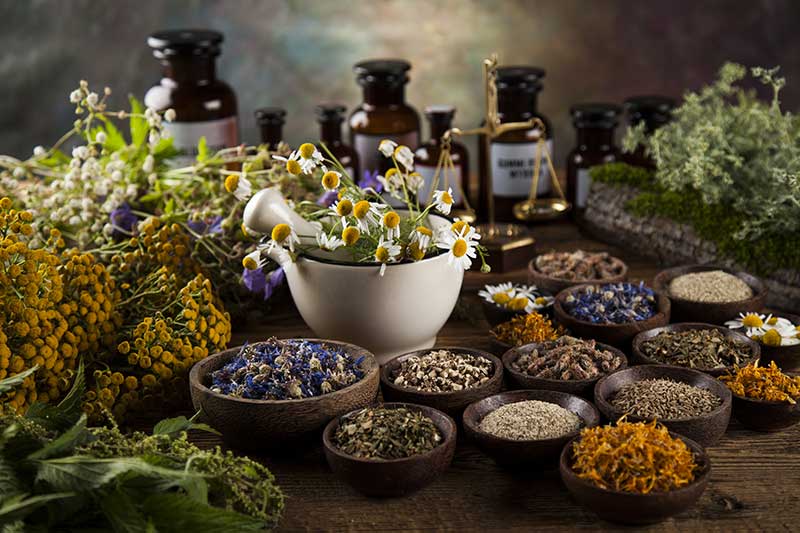Not only is it a Monday but it’s only 10am and the day is already taking its toll. Where do we turn? To coffee and sugar, of course. Because a sweet treat and a hit of caffeine will surely make the day that little bit better, no? Actually, no. By turning to caffeine and sugar, your body receives a hit of something it likes which gets your heart pumping and boosts your mood; but that feeling is limited. After just an hour or two if you’re lucky, your body will start to crash and you’ll end up feeling a million times worse than you did before. For a perk-up that holds up, you’d best choose “adaptogens” instead.
To find out what adaptogens are, their benefits and the best adaptogenic herbs, keep reading.
What Are Adaptogens?
Adaptogens are a group of herbal ingredients that are proven to boost the health of your adrenal system. Your adrenal glands or suprarenal glands, produce steroid hormones and are responsible for balancing your body’s hormones, including those that help you to manage stress, balance your body’s blood sugar, get your energy levels and metabolism up to scratch, and boost your immune system. If you suffer from chronic stress, you may quickly exhaust your adrenal system and experience side effects, including finding it much harder to concentrate, fatigue, irritability, body aches, and anxiety.
Predominately, adaptogens can be used to help balance stress; they are called adaptogens because they can “adapt” to your body’s needs and address imbalances. Their use in Chinese and Indian Ayurvedic medicine dates back thousands of years, and they are just as widely used today, if not more so. Adaptogens are completely safe and can be used long-term, unlike common anxiety medication such as diazepam, which you can take for up to four weeks before withdrawal sets in when you stop.
Adaptogens are like a thermostat. When your hormone levels are too low or too high, they work to balance your hormones and, consequently, reduce stress while boosting energy levels without overstimulating your body. As an entirely natural method of controlling your mood, adaptogens are much preferred over sugar and caffeine as they offer gradual balance without adverse effects – such as the crash you may feel after having a doughnut or cup of coffee – for better, balanced health.
Now you know the benefits of adaptogens, below, discover some of the best adaptogenic herbs.
Best Adaptogenic Herbs
Whether it’s a root, berry, fungus or herb in the traditional sense, there are many types of adaptogens out there; all of which have different properties and benefits. If you’re looking for ways to deal with stress or are experiencing adrenal exhaustion, explore some of the best adaptogenic herbs below.
Amla
Also referred to as the Indian gooseberry, amla is an Ayurvedic tonic that promotes life longevity and good memory, as well as supporting optimum liver health and function. Amla is rich in vitamins B and C, as well as minerals such as calcium, phosphorus and iron – it encourages strong, healthy bones, teeth and hair. Amla is also an anti-inflammatory and can be used as a laxative to improve digestion.
Ashwagandha
Widely regarded as one of the most potent herbs in Ayurvedic medicine, ashwagandha is a root that serves as an effective relaxant; helping to calm nerves and reduce anxiety and stress-related insomnia. It also assists immune system health. In men, ashwagandha has been found to support fertility while, in women, it is used during menstruation to balance nutrient levels thanks to its high iron content.
Eleuthero
With an array of benefits for both men and women, eleuthero is another highly regarded adaptogenic herb. Not only does it support the immune system – which means you’ll be less prone to common illnesses such as colds – but it also helps to balance cholesterol. If you have a high-stress job or a sporadic work schedule, eleuthero is ideal. It encourages restful sleep and will help you to sleep through – better still, it doesn’t cause drowsiness in the day, so you don’t need to worry about nodding off at work. If you often feel stressed or anxious, eleuthero can also help balance blood sugar levels.
Holy Basil
Also known as tulsi and similar to mint, holy basil is a tonic; however, it can also be brewed as a tea and helps to settle nausea, including an upset stomach and vomiting. Concerning mental health, holy basil can be used to treat depression and as a measure to calm nerves and anxiety. The herb is an antioxidant, which means it can also be used to promote physical recovery – particularly head trauma.
Pau D’Arco
Revered in South America, the inner bark of the Pau d’arco tree is brewed to create a herbal tea or lapacho with an assortment of health benefits. The herb is an antioxidant that boosts immune function and can be used to treat a variety of ailments, including infection, fever, sickness and stomach problems. It is also used as an anti-inflammatory and may reduce the risk of asthma and diabetes.
Rhodiola
Native to cooler, northern climates such as Canada, Russia, and Scandinavia, rhodiola is brewed as a tonic to treat depression and reduce nerves and anxiety. It can also help to boost concentration and energy levels; if you’re experiencing exhaustion, rhodiola may help. In both men and women, rhodiola is found to support fertility. It also supports immune function – especially during and after exercise.
In Summary
Adaptogenic herbs are safe and promote good health, including both mental and physical health. If you’re stressed or suffer from anxiety, adaptogens will help to rebalance your hormones and make you feel much calmer. Physically, adaptogens can also boost immune function to reduce illness and encourage healing. As with all types of alternative medicine, always consult your doctor before trying adaptogenic herbs as some, such as pau d’arco, have adverse effects when taken with medication.

